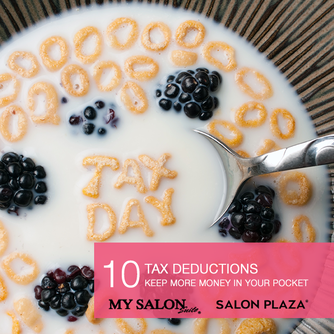Very few people want to pay more taxes than they technically owe, but the tax code is so complex that it’s easy for Salon Suite owners to overlook some of the deductions you may be entitled to take.
ACTION STEPS
Review your activities and expenses from last year to see if you overlooked some of these potential deductions. Gather needed receipts and records to make filing your taxes easier and hopefully reduce your tax bill (or increase your tax refund).
** For all of the deductions listed below, please note this is general information. Remember just how complex the tax code is, it’s best to consult with a tax professional to be sure that you’re taking all of the deductions you are entitled to take.
If you’re planning to file your own taxes, software like TurboTax for Home and Business enable you to file federal and state taxes, and will ask you helpful questions throughout the process to help ensure you take all of the deductions that apply. You can also get additional advice from books and manuals that help to simplify the tax code, like Lower Your Taxes BIG TIME: 2017-2018 Edition and 475 Tax Deductions for Businesses and Self-Employed Individuals.
10 Commonly Overlooked Tax Deductions for Salon Suite Owners
1. Education – Classes, Books and Training
The same education you invest in to make yourself a better beauty industry professional and a better Salon Suite business owner can also help reduce your tax burden! Forbes.com notes that educational expenses for classes, training, books, class supplies, etc., should qualify if it meets either one of these two criteria:
- Maintains or improves skills required in your employment, trade or business
- Meets the express requirements of your employer or applicable laws and regulations (such as licensing) required to maintain your career
Keep track of the money you spend not only on class and training fees, but other related expenses like class supplies and books. Under this heading, money you spend attending educational conferences may also be tax deductible, including travel costs.
2. Travel and Mileage
Generally driving to and from the Salon Suite to work day in and day out is not deductible. However, travel that you make for business purposes otherwise (such as travel to a class or distributor store) may entitle you to deduct mileage. For 2017, the mileage deduction is 53.5 cents per mile driven for business purposes. Other business driving-related costs that might be deductible include tolls and parking.
The IRS guidelines for deductible business travel expenses are available on the IRS.gov site. These expenses apply if you’re traveling away from the general area of your home for a period of time for business purposes – far enough away that you need to get rest or sleep. In this case, travel expenses like air fare, meals, lodging and other costs may all be deductible. It’s also worth mentioning that while you cannot deduct travel expenses while looking for your first job, if you traveled while looking for a new job in your present trade last year, those expenses may be deductible. (Like we said, the tax code is complex!)
3. Medical Expenses
Unreimbursed medical expenses that exceed 7.5% of your adjusted gross income in 2017 may be deductible. These may include preventative care as well as treatment, surgeries, dental and vision related medical expenses. You must itemize in order to claim these types of deductions.
4. Products, Tools and Supplies
Nearly all of the things you buy for your Salon Suite may qualify as a tax deduction. This includes furniture, tools, supplies, products, décor, etc.
5. Insurance
While your personal insurance costs (medial, auto, etc.) don’t qualify as business tax deductions, the premiums you pay on business insurance should qualify. This includes any type of business insurance – fire, theft, flood, property, general liability, malpractice, workers compensation, etc.
6. Tax Preparation Costs
Working with a tax professional to be sure your taxes are filed accurately and you don’t pay more than you owe is a great idea for many reasons. One of these reasons is that you can also deduct their fees from your tax bill!
7. Marketing and Advertising
Marketing and advertising materials (business cards, flyers, postcards, etc.) and related expenses, like money paid for website hosting, development, logo, graphic design and other services are generally deductible:
- any materials used to promote your Salon Suite
- any costs related to developing them
8. Equipment Depreciation
In this case, “equipment” refers to business assets like computers, office equipment, tools and furniture, and generally refers to items that have a useful life of more than one year. Check with your tax professional to determine whether it would be best to deduct the cost of an item from your tax bill all at once or whether it should be depreciated over the course of a few (or even several) years.
9. Business Interest Expense
Business interest expense refers to interest incurred on business loans. To qualify as a deduction, the loan has to be purchase assets for the business or pay its expenses. Interest incurred on any amount uses for non-business purposes must be subtracted from the amount deemed to be deductible.
10. General Expenses
Any other services you pay for, such as cleaning services, bookkeeping services, marketing agency services, etc., in the course of running your business may all be tax deductible. Likewise, any supplies used (office supplies, cleaning supplies, etc.) may also be deductible.
Worried about changes in the tax code for 2018?
While these deductions may apply to your 2017 taxes, it’s worth noting that most if not all of these should still apply when the new tax code takes effect next year. This MarketWatch.com article talks about some of the more significant tax changes for business owners when the time comes to file 2018 taxes.


